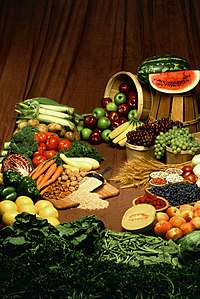Whole-food plant-based diet: Difference between revisions
chronic link, nutrition |
No edit summary |
||
| Line 1: | Line 1: | ||
{{other uses|Whole Foods (disambiguation)}} |
[http://new2012fastfoodsrecepies.blogspot.com/ Easy food and ice cream recepies]{{other uses|Whole Foods (disambiguation)}} |
||
[[Image:Foods.jpg|thumb|right|200px]] |
[[Image:Foods.jpg|thumb|right|200px]] |
||
Revision as of 09:20, 24 April 2012
Easy food and ice cream recepies

Whole foods are foods that are unprocessed and unrefined, or processed and refined as little as possible, before being consumed. Whole foods typically do not contain added ingredients, such as salt, carbohydrates, or fat.[1] Examples of whole foods include unpolished grains, beans, fruits, vegetables and non-homogenized dairy products.[2] Although originally all human food was whole food,[2] one of the earliest uses of the term post-industrial age was in 1960 when the leading organic food organization called the Soil Association opened a shop in the name selling organic and whole grain products in London, UK.[3]
The term is often confused with organic food, but whole foods are not necessarily organic, nor are organic foods necessarily whole.
The United States Food and Drug Administration defines whole grains as cereal grains containing the bran, endosperm and germ of the original grain.[4] Federal Dietary Guidelines issued by the Center for Nutrition Policy and Promotion in 2005 recommended the consumption of at least three servings of whole grains each day, as there is evidence that they help cut risk of cancer and heart disease.[4]
"Diets rich in whole and unrefined foods, like whole grains, dark green and yellow/orange-fleshed vegetables and fruits, legumes, nuts and seeds, contain high concentrations of antioxidant phenolics, fibers and numerous other phytochemicals that may be protective against chronic diseases."[1]
A focus on whole foods offers three main benefits over a reliance on dietary supplements: they provide greater nutrition for being a source of more complex micronutrients, they provide essential dietary fiber and they provide naturally occurring protective substances, such as phytochemicals.[5]
See also
References
- ^ a b Bruce, B; Spiller, GA; Klevay, LM; Gallagher, SK (2000). "A diet high in whole and unrefined foods favorably alters lipids, antioxidant defenses, and colon function". Journal of the American College of Nutrition. 19 (1): 61–7. PMID 10682877.
- ^ a b The Whole Food Bible : How to Select & Prepare Safe, Healthful Foods, by Christopher S. Kilham. ISBN 0892816260.
- ^ Organic farming: an international history by Lockeretz, William CABI Publishing Series. ISBN 085199833X
- ^ a b Squires, Sally. Guidelines Provide A Definition of Whole-Grain Food. The Washington Post. 16 Feb. 2006.
- ^ "Supplements: Nutrition in a pill?". Mayo Clinic. Retrieved 2011-12-12.
